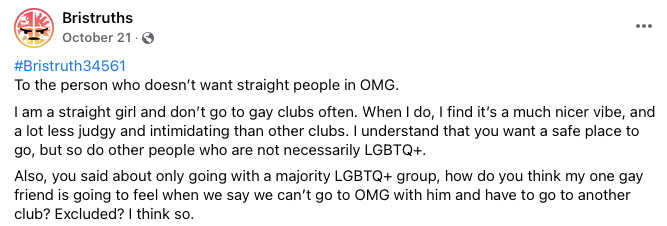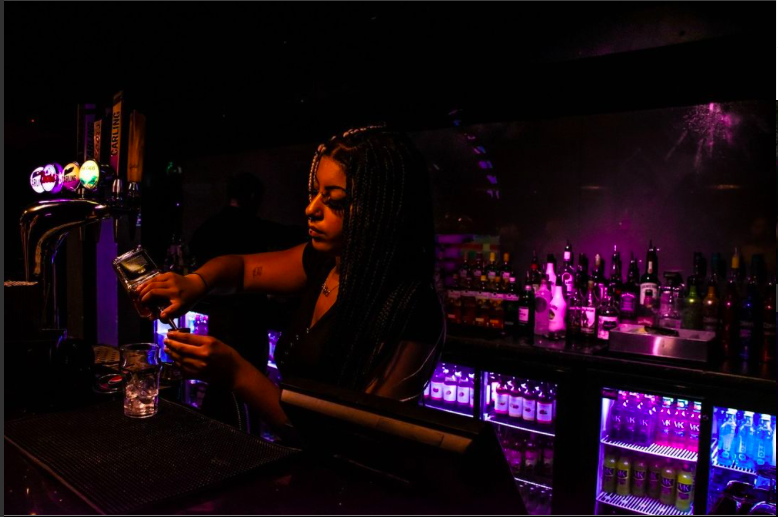Eva Radhika Gurnani, Spanish and Portugese, Third Year
As part of arguably the most popular chain of gay nightclubs in the country, or self-proclaimed ‘Most euphoric gay venue in the UK’, OMG is widely considered a staple part of Bristol nightlife.
With themed nights and drag events boasting impressive line-ups, cheap and cheerful drinks and an overall buzzing atmosphere, the venue is a favourite among Bristolians.
Very few other clubs can compete with its student-friendly prices and feel-good throwback tunes, so it makes sense that these features are appreciated and enjoyed by LGBTQ+ and non-LGBTQ+ communities alike.
It is worth questioning, however, whether this fondness for OMG felt by students who do not identify as queer has overstepped its limit, encroaching on the ownership LGBTQ+ Bristolians have, and should have, over the venue.
It is logical that those outside the queer community enjoy nights out at OMG. Who doesn’t love to feel at ease in a space which champions unashamed acceptance of yourself and others? This kind of environment is comforting to us all, yet it is easy to forget that for the LGBTQ+ student population spaces which encourage their self-love and acceptance carry a different weight.
Just as watching Ru Paul’s Drag Race or listening to LGBTQ+ artists who celebrate being their authentic selves can make us all feel inspired and boost our confidence, the same sentiment is palpable in the air at OMG is something we can all appreciate.
It’s a difficult line to draw, since there is no reasonable way to put in place formal measures to maintain queer ownership over the club
However, like Drag Race or a Janelle Monáe song celebrating her sexuality, the club was created with the primary intention of providing a safe space for queer expression, before the enjoyment of those outside the LGBTQ+ community.
For groups which have historically been ostracised from mainstream nightlife due to their sexuality or gender identity, the need for ownership of a place where they can express their identities as a collective is vital for their sense of belonging.
While formally there is no longer anything preventing queer students’ access to other areas of Bristol nightlife, in practice there are still so many events organised for mainly straight, cisgender communities which are far from approachable for the queer community.
Just think of the nature of countless sports nights, catering to stereotypically laddish football teams, and you can understand how easy it is for LGBTQ+ students who do not conform to the typical attendee profile to feel othered, even if this is unintended by those around them.

However, with the growing comfort felt by the straight, cisgender majority inside OMG their presence there has been normalised, detracting from queer students’ sense of belonging to a space which was created so they could call it their own.
In addition, those who do not identify as queer can far too often be seen behaving inappropriately at the club, creating precisely the isolating and hostile atmosphere queer students come to gay clubs to avoid.
Those who do not identify as LGBTQ+ need to consider their attitudes towards the club
It is not uncommon to hear non-LGBTQ+ clubgoers making ignorant remarks, demanding that queer students judge whether they can ‘pass’ as gay or making deriding jokes that they must be trying to hit on them.
It’s a difficult line to draw, since there is no reasonable way to put in place formal measures to maintain queer ownership over the club. Even if restrictions were put in place to limit the number of non-LGBTQ+ attendees, which I do not believe they should, this would be impracticable and almost impossible to control.
Any attempt to vet someone’s queerness within the short period of time spent talking to the bouncer would be based on rash impressions, and using appearance or demeanour as parameters to decide if someone is 'sufficiently gay' would be a dangerous move enforcing the idea that people must conform to a specific image or expression for their queerness to be valid.
Moreover, for those who choose not to share their queerness with others, finding comfort in a space which is accepting of your sexuality or gender identity without having to talk about it or prove yourself is crucial.
Do you respect the venue as a space belonging to queer students?
Not only would this type of restriction go against the notion of unbridled self-expression at the heart of OMG, but also it would place the burden of protecting the space on the queer community themselves.
Thus, it seems that the best solution, due to both practicality and the importance of protecting queer students’ ability to express themselves freely, is for those who do not identify as LGBTQ+ to consider their attitudes towards the club.
Do you respect the venue as a space belonging to queer students, or do you feel a level of ownership over OMG comparable to that over other clubs in Bristol?
Do you come to the club to support your queer friends, or do you see a night out there as simply an opportunity to spectate at queer culture? The onus is on those outside the queer community to ensure their behaviour does not impinge on queer spaces.
Featured image: @omgbristol
Let us know what you think about non-LGBTQ+ access to 'safe' venues on twitter @EpigramOpinion









